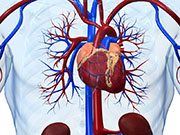No decrease in rate of major CV events, net adverse clinical events for patients undergoing PCI
TUESDAY, Sept. 1, 2015 (HealthDay News) — For patients with an acute coronary syndrome undergoing percutaneous coronary intervention (PCI), bivalirudin does not lower the rates of major adverse cardiovascular events, according to a study published online Sept. 1 in the New England Journal of Medicine. The research was published to coincide with the annual European Society of Cardiology Congress, held from Aug. 29 to Sept. 2 in London.
Marco Valgimigli, M.D., Ph.D., from Bern University Hospital in Switzerland, and colleagues randomized 7,213 patients with an acute coronary syndrome for whom PCI was anticipated to receive bivalirudin or unfractionated heparin. Patients in the bivalirudin group were then randomized to receive a post-PCI bivalirudin infusion, or not.
The researchers found that the rates of major cardiovascular events (P = 0.44) and net adverse clinical events (P = 0.12) were not significantly lower with bivalirudin versus heparin. Compared with no infusion, post-PCI bivalirudin infusion was not associated with a significant decrease in the rate of urgent target-vessel revascularization, definite stent thrombosis, or net adverse clinical events (P = 0.34).
“In patients with an acute coronary syndrome, the rates of major adverse cardiovascular events and net adverse clinical events were not significantly lower with bivalirudin than with unfractionated heparin,” the authors write. “The rate of the composite of urgent target-vessel revascularization, definite stent thrombosis, or net adverse clinical events was not significantly lower with a post-PCI bivalirudin infusion than with no post-PCI infusion.”
Several authors disclosed financial ties to pharmaceutical and medical device companies, including the Medicines Company (which manufactures bivalirudin) and Terumo Medical, both of which funded the study.
Copyright © 2015 HealthDay. All rights reserved.








